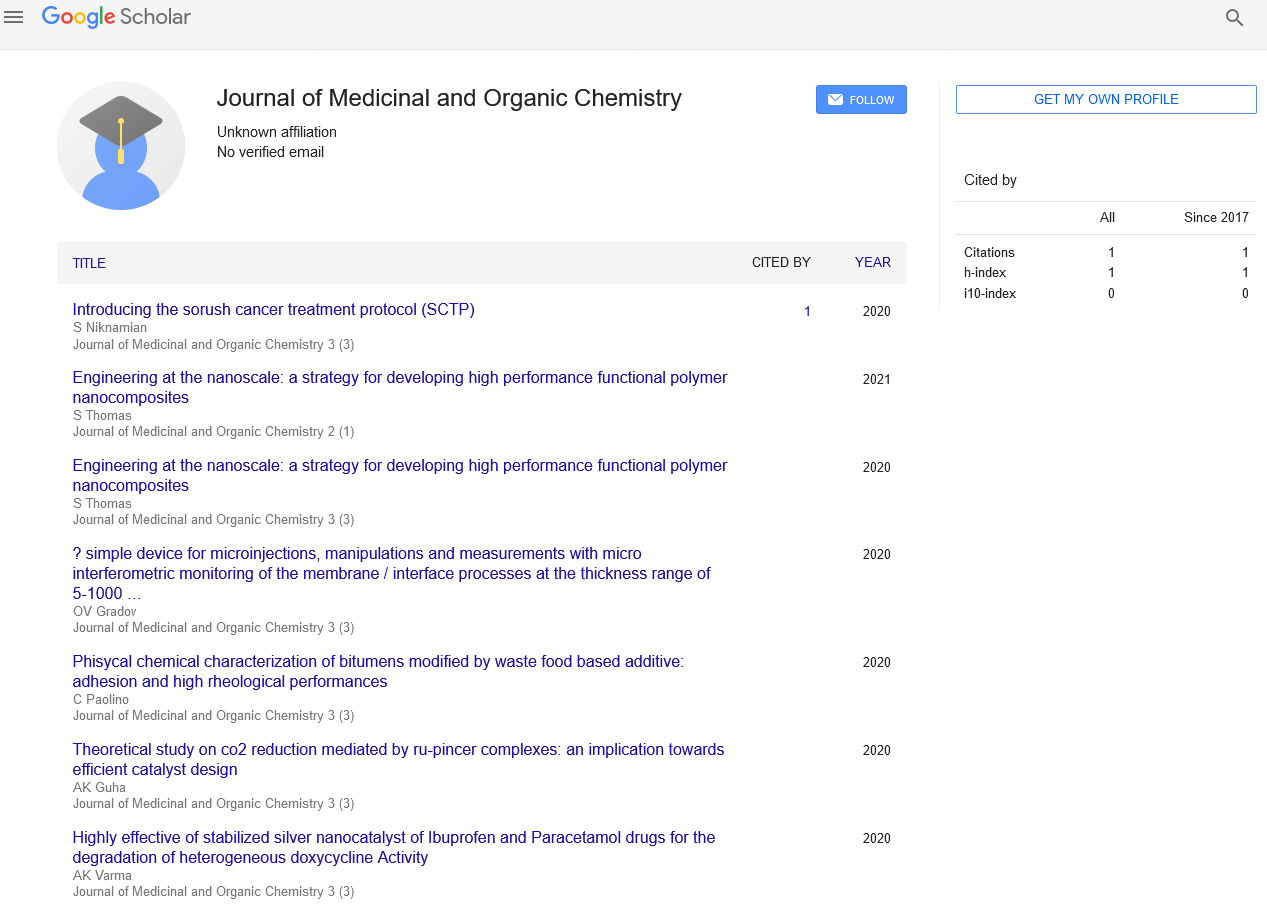Editorial - Journal of Medicinal and Organic Chemistry (2023) Volume 6, Issue 2
A Short Note on Immunology and Nutrition
Dr. Zahra Mohamd*
Department of Genetics and Immunology, University of GSOT Biotechnology, Iran
Department of Genetics and Immunology, University of GSOT Biotechnology, Iran
E-mail: mo.zahra@gamil.com
Received: 31-Mar-2023, Manuscript No. jmoc-23-95154; Editor assigned: 03-April-2023, PreQC No. jmoc-23- 95154; Reviewed: 17-April-2023, QC No: jmoc-23-95154; Revised: 21-April-2023, Manuscript No. jmoc-23-95154 (R); Published: 28-April-2023; DOI: 10.37532/ jmoc.2023.6(2).16-18
Abstract
Immunology is the study of the immune system and its functions, including the body's defense against foreign substances, such as pathogens and cancer cells. The immune system is a complex network of cells, tissues, and organs that work together to protect the body from harm. The immune system can be divided into two main categories: innate immunity and adaptive immunity. Innate immunity is the body's first line of defense and provides immediate protection against pathogens. This type of immunity is non-specific, meaning it responds the same way to any pathogen it encounters. Examples of innate immune cells include macrophages, neutrophils, and natural killer cells. Nutrition is a vital aspect of overall health and well-being. It involves the intake of food and how the body utilizes the nutrients from food to function properly. Proper nutrition is essential for maintaining a healthy body weight, preventing chronic diseases, and supporting the body's natural functions. Adaptive immunity, on the other hand, is specific and takes longer to develop. This type of immunity recognizes and remembers specific pathogens, providing long-term protection against them. Adaptive immunity is mediated by lymphocytes, a type of white blood cell. There are two types of lymphocytes: B cells and T cells. B cells produce antibodies that can recognize and neutralize pathogens, while T cells directly attack infected cells.
Keywords
PImmunology • Immune system • Pathogens and cancer cells • B cells and T cells • Attack infected cells • Macrophages • Neutrophils • Natural killer cells
Introduction
The human immune system is a complex network of cells, tissues, and organs that work together to protect the body from harmful pathogens and foreign substances. While genetics and environmental factors play a significant role in immune function, emerging evidence suggests that diet and nutrition may also play a crucial role in shaping the immune response [1]. The nutrients we consume through our diet are essential for supporting the growth and function of immune cells, which play a vital role in fighting off infections and diseases.
The human immune system is a complex network of cells, tissues, and organs that work together to protect the body from harmful pathogens and foreign substances. While genetics and environmental factors play a significant role in immune function, emerging evidence suggests that diet and nutrition may also play a crucial role in shaping the immune response [1]. The nutrients we consume through our diet are essential for supporting the growth and function of immune cells, which play a vital role in fighting off infections and diseases.
For example, autoimmune diseases occur when the immune system mistakenly attacks the body’s own tissues, leading to inflammation and damage. Examples of autoimmune diseases include rheumatoid arthritis, lupus, and multiple sclerosis [3].
Immunodeficiency disorders, on the other hand, occur when the immune system is unable to properly respond to pathogens, leaving the body vulnerable to infections [4]. Examples of immunodeficiency disorders include HIV/AIDS and severe combined immunodeficiency (SCID). Immunology research has led to the development of numerous therapies and treatments for immune-related disorders. For example, vaccines work by exposing the immune system to a weakened or dead pathogen, triggering an immune response and providing long-term protection against the pathogen [5]. Additionally, immunotherapy, which involves using the body’s immune system to target and destroy cancer cells, has shown promising results in treating various types of cancer.
The food we eat is made up of nutrients, which are substances that the body needs for growth, maintenance, and repair. There are six main categories of nutrients that are essential for good health: carbohydrates, protein, fat, vitamins, minerals, and water [6]. Each of these nutrients plays a different role in the body. Carbohydrates are the primary source of energy for the body. They are found in foods such as bread, pasta, rice, fruits, and vegetables. Protein is essential for building and repairing tissues, and it is found in foods such as meat, fish, poultry, beans, and tofu. Fat is necessary for proper brain function, hormone production, and insulation, and it is found in foods such as oils, nuts, and seeds. Vitamins and minerals are essential for many different bodily functions. For example, vitamin C helps with the immune system, while calcium is necessary for strong bones [7]. These nutrients are found in a variety of foods, including fruits, vegetables, dairy products, and meats. Water is also crucial for good health. It helps to regulate body temperature, transport nutrients throughout the body, and remove waste products. It is important to drink enough water throughout the day to maintain hydration and prevent dehydration. A healthy diet is one that provides all of the necessary nutrients in the right amounts. Eating a variety of foods from each food group is key to achieving this. A balanced diet should include plenty of fruits and vegetables, whole grains, lean proteins, and healthy fats [8].
There are many benefits to maintaining a healthy diet. Proper nutrition can help prevent chronic diseases such as heart disease, diabetes, and certain cancers. It can also improve mental health, boost energy levels, and support a healthy immune system. In addition to eating a healthy diet, it is also important to practice good eating habits. This includes things like eating slowly, chewing food thoroughly, and avoiding distractions while eating [9]. It is also important to pay attention to portion sizes and limit intake of foods high in saturated fat, added sugars, and sodium.
Here are some ways in which nutrition can affect the immune system:
Micronutrients and immune function
Micronutrients, such as vitamins and minerals, are essential for proper immune function. For example, vitamin C plays a critical role in supporting immune cells’ growth and function, while vitamin D is essential for regulating the immune response and preventing chronic inflammation. Other important micronutrients for immune function include vitamin A, zinc, and selenium [10].
A diet that lacks these essential micronutrients can weaken the immune system, making it more susceptible to infections and diseases. For instance, a deficiency in vitamin C can lead to scurvy, a disease that weakens the immune system and can cause skin rashes, fatigue, and gum disease.
Gut health and immune function
The gut is home to trillions of microorganisms that play a critical role in regulating the immune response. The gut microbiota, as it is called, helps to promote the growth and function of immune cells in the gut and throughout the body.
The type of diet we consume can significantly affect the gut microbiota’s composition and diversity, which, in turn, affects immune function. For instance, a diet rich in fiber and prebiotics can promote the growth of beneficial gut bacteria, which can enhance immune function and protect against diseases. On the other hand, a diet high in saturated fats and sugar can alter the gut microbiota’s composition, leading to chronic inflammation and a weakened immune response.
Inflammation and immune function
Chronic inflammation is a significant risk factor for many chronic diseases, including cancer, heart disease, and diabetes. It is also thought to play a role in weakening the immune system, making it less effective at fighting infections and diseases.
Diet plays a crucial role in regulating inflammation levels in the body. A diet rich in anti-inflammatory nutrients, such as omega-3 fatty acids and antioxidants, can help to reduce inflammation levels, thereby improving immune function. On the other hand, a diet high in pro-inflammatory foods, such as processed meats, fried foods, and refined carbohydrates, can increase inflammation levels and weaken the immune system.
Caloric intake and immune function
Caloric intake, or the number of calories we consume through our diet, can also affect immune function. Studies have shown that both over nutrition and under nutrition can lead to immune dysfunction, making the body more susceptible to infections and diseases.
For instance, obesity, which is often caused by a diet high in calories and saturated fats, is associated with chronic inflammation and a weakened immune response. On the other hand, severe calorie restriction, such as that seen in anorexia nervosa, can lead to a weakened immune system, making the body more susceptible to infections.
Conclusion
Nutrition plays a crucial role in shaping the immune response. A diet rich in essential micronutrients, fiber, and anti-inflammatory nutrients can help to enhance immune function, while a diet high in saturated fats, sugar, and pro-inflammatory foods can weaken the immune system. By adopting a healthy and balanced diet, we can help to support our immune system’s growth and function, reducing our risk of infections and diseases.
Immunology is a crucial field of study that plays a vital role in protecting the body from infections and diseases. Understanding the immune system’s functions and dysfunctions can help researchers develop new therapies and treatments for various immune-related disorders, ultimately improving human health and wellbeing. Proper nutrition is essential for overall health and well-being. Eating a balanced diet that includes a variety of foods from each food group can provide all of the necessary nutrients for good health. Practicing good eating habits and limiting intake of unhealthy foods can also contribute to a healthy diet. By prioritizing nutrition, individuals can support their physical and mental health and reduce their risk of chronic diseases.
References
- Adams DD. Autoimmune destruction of pericytes as the cause of diabetic retinopathy. Clinical Ophthalmology. 2, 295-298 (2008).
- Huang ES, Brown SE, Ewigman BG et al. Patient perceptions of quality of life with diabetes-related complications and treatments. Diabetes Care. 30, 2478-2483 (2007).
- Reynolds A, Mann J, Cummings J et al. Carbohydrate quality and human health: a series of systematic reviews and meta-analyses. Lancet. 393, 434-445 (2019).
- Carrillo JE, Carrillo VA, Perez HR et al. Defining and targeting health care access barriers. J Health Care Poor Underserved. 22, 562-75 (2011).
- Jones G, Steketee RW, Black RE et al. How many child deaths can we prevent this year? Lancet. 362, 65-71 (2003).
- Lvovs D, Favorova OO, Favorov AV et al. A Polygenic Approach to the Study of Polygenic Diseases. Acta Naturae. 4, 59-71 (2012).
- Yoshiura K, Kinoshita A, Ishida T et al. A SNP in the ABCC11 gene is the determinant of human earwax type. Nat Genet. 38, 324-30 (2006).
- Pratley RE, Rosenstock J, Pi-Sunyer FX et al. Management of type 2 diabetes in treatment-naive elderly patients: benefits and risks of vildagliptin monotherapy. Diabetes Care. 30, 3017-3022 (2007).
- Doucet J, Chacra A, Maheux Pet et al. Efficacy and safety of saxagliptin in older patients with type 2 diabetes mellitus. Curr Med Res Opin. 27, 863-869 (2011).
- Huang ES, Brown SE, Ewigman BG et al. Patient perceptions of quality of life with diabetes-related complications and treatments. Diabetes Care. 30, 2478-2483 (2007).
Indexed at, Google Scholar, Crossref
Indexed at, Google Scholar, Crossref
Indexed at, Google Scholar, Crossref
Indexed at, Google Scholar, Crossref
Indexed at, Google Scholar, Crossref
Indexed at, Google Scholar, Crossref
Indexed at, Google Scholar, Crossref
Indexed at, Google Scholar, Crossref

